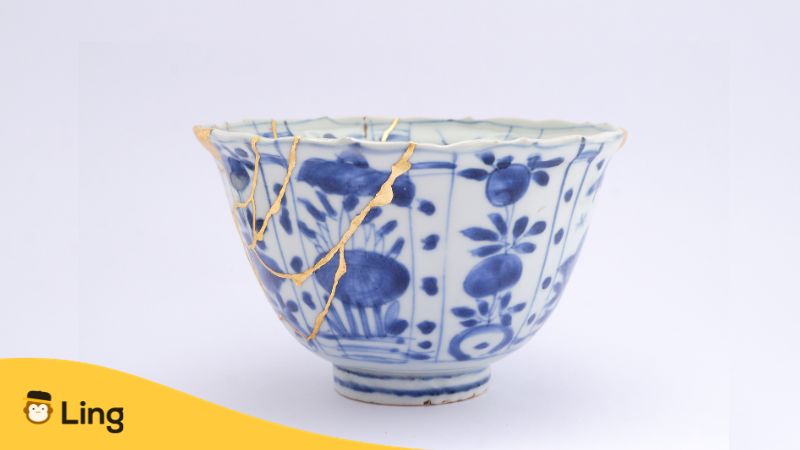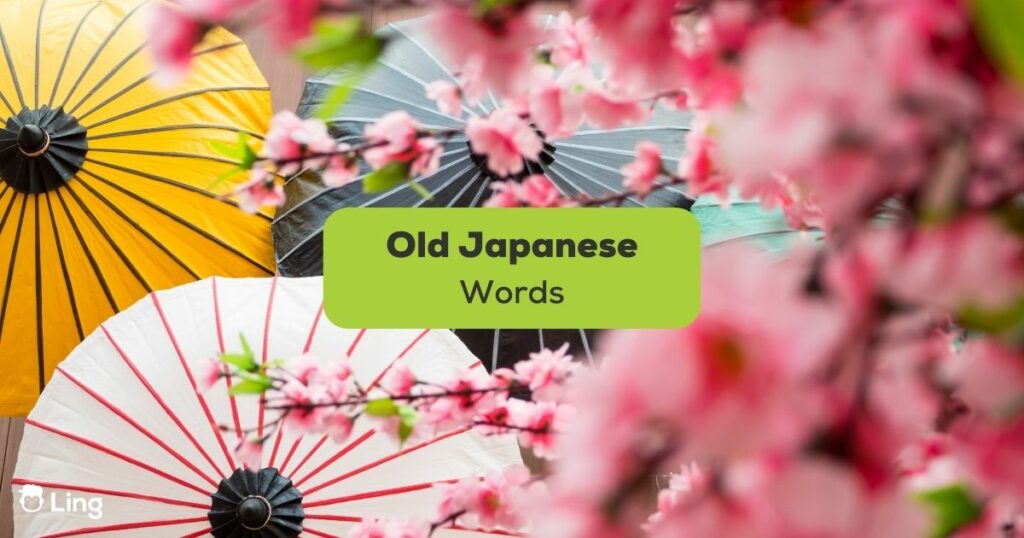In a rapidly changing world, language evolves at an astonishing pace. Words come and go, often reflecting the cultural, social, and technological shifts of their times. These linguistic treasures offer us a window into the past, allowing us to explore the rich tapestry of Japanese language and culture.
In this article, we will delve into the fascinating world of old Japanese words and characters, unraveling their meanings and significance.
Old Japanese Words
Old Japanese words embody profound Japanese wisdom. These words find beauty in imperfection, reminding us to appreciate life’s transience. These words offer cultural insights, teaching us to embrace simplicity, find peace in the imperfect, and cherish the ephemeral, reflecting the depth of Japanese philosophy in just a few syllables.
1. Wabi-Sabi – 侘寂
One of the most famous old Japanese words is “Wabi-Sabi.” This concept embodies the appreciation of imperfection and transience. It celebrates the beauty found in the imperfect, incomplete, and impermanent aspects of life. Wabi-Sabi encourages us to find contentment in simplicity and the passage of time.

2. Kintsugi – 金継ぎ
Related to Wabi-Sabi is “Kintsugi,” the art of repairing broken pottery with gold lacquer. This practice transforms broken objects into something more beautiful than the original. It’s a profound metaphor for healing and resilience, teaching us that scars can add to our beauty and history.
3. Mono No Aware – 物の哀れ
“Mono no Aware” is a term that encapsulates the sensitivity to the ephemeral nature of things. It is a deep emotional connection to the beauty of fleeting moments. This concept reminds us to savor the present and appreciate the transient nature of life.
4. Yugen – 幽玄
“Yugen” is an old Japanese word that represents profound beauty and mystery. It suggests that true beauty lies in what is unseen and unfathomable. Yugen encourages us to find wonder in the unknown and embrace the mysteries of existence.
5. Ikebana – 生け花
“Ikebana” is not just flower arranging; it’s a form of artistry and meditation. This ancient practice emphasizes harmony, balance, and the use of minimalistic elements to create breathtaking floral compositions.

6. Shinrin-Yoku – 森林浴
In a fast-paced world, “Shinrin-Yoku” or forest bathing offers a way to reconnect with nature. This practice involves immersing oneself in the forest, absorbing its sights, sounds, and scents. It’s a powerful antidote to the stresses of modern life.
7. Noh – 能
“Noh” is a traditional Japanese performing art with deep historical roots. It combines music, dance, and drama to create a mesmerizing experience. Each movement and gesture in Noh has profound meaning and symbolism.
8. Kigo – 季語
In the realm of poetry, “Kigo” refers to seasonal words that convey the essence of a particular season. These words add depth and vividness to traditional Japanese poetry forms like Haiku and Tanka.
9. Hanami – 花見
“Hanami” is the centuries-old tradition of cherry blossom viewing. It’s a time when people gather under blooming cherry trees to appreciate the fleeting beauty of these delicate blossoms, often with picnics and festivities.
10. Mushin – 無心
“Mushin” represents a state of no mind, a concept deeply rooted in Zen Buddhism, one of the prominent religions of Japan. It is the idea of acting without overthinking, achieving a sense of flow and spontaneity in one’s actions.
Fun fact: Did you know that Sino-Japanese words have a big Chinese influence and the Japanese kanji are actually made of Chinese characters? You can learn more about the similarities and differences of these two languages in our Chinese vs. Japanese vs. Korean article!
More Old Japanese Words With Translations
| English | Kanji | Romaji |
|---|---|---|
| Samurai | 武士 | Bushi |
| Martial Arts | 武道 | Budō |
| Traditional Japanese clothing | 和服 | Wafuku |
| Shinto Shrine | 神社 | Jinja |
| Buddhism | 仏教 | Bukkyō |
| Kabuki Theater | 歌舞伎 | Kabuki |
| Samurai | 侍 | Samurai |
| Tea Ceremony | 茶道 | Sadō |
| Sculpture | 彫刻 | Chōkoku |
| Painting | 絵画 | Kaiga |
| Japanese Poetry | 和歌 | Waka |
| Seal Carving | 篆刻 | Tenkoku |
| Swords | 刀剣 | Tōken |
| Archery | 弓道 | Kyūdō |
| Flower Arranging | 華道 | Ikebana |
| Medicinal Herbs | 薬草 | Yakusō |
| Pottery | 陶芸 | Tōgei |
| Sliding Paper Ddoor | 障子 | Shōji |
| Kimono | 着物 | Kimono |
| Throwing Stars | 手裏剣 | Shuriken |
| Ninja | 忍者 | Ninja |
| Samurai Helmet | 甲冑 | Kabuto |
| Wooden Sword | 木刀 | Bokken |
| Traditional Court Music | 雅楽 | Gagaku |
| Fine Arts | 美術 | Bijutsu |
| Calligraphy | 書道 | Shodō |
| Zen Buddhism | 銭 | Zen |
| Japanese Paper | 和紙 | Washi |
Old Japanese words are like time capsules, preserving the wisdom, aesthetics, and values of generations past. They offer us valuable lessons in appreciating the beauty of imperfection, embracing the transient nature of life, and finding harmony with nature and oneself. As we explore these linguistic gems, we also discover the reflection of ancient Japanese culture in today’s spoken language.
FAQs About Old Japanese Words
Are these old Japanese words still in use today?
While some are less commonly spoken in everyday conversation, many of these words still hold cultural and artistic significance in Japan.
Can non-Japanese speakers appreciate the depth of these words?
Absolutely! The beauty of language transcends borders, and anyone can find inspiration and meaning in these concepts.
Are there other old Japanese words worth exploring?
Indeed, Japanese culture is rich with linguistic gems. The ones mentioned here are just the tip of the iceberg.
How can I incorporate these concepts into my daily life?
You can start by practicing mindfulness, appreciating nature, and finding beauty in simplicity, just like these historical Japanese words suggest.
Where can I learn more about classical Japanese culture and language?
Consider enrolling in language courses, reading books, and exploring cultural events or museums dedicated to Japan.
Start Learning Japanese With Ling!
If you’re interested in learning Japanese, or other less spoken languages of Asia, Ling is a great app to try. With its interactive lessons, real-life vocabulary, native speaker audio and AI chatbots to practice conversational skills, Ling is an all-in-one language learning resource.
Whether you want to improve your proficiency in the Japanese language or start from scratch, Ling provides a comprehensive platform for learners of all levels. From essential vocabulary to useful daily phrases and sentence structures, Ling offers a structured Japanese course that will help you build a strong foundation in the Japanese language.
Download Ling from the App Store or Play Store now and connect through language!































































